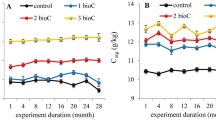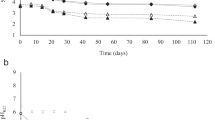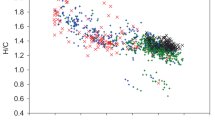Abstract
DURING an investigation into the physical properties of humic acids, humic products were extracted from mixtures of papyrus and various additives such as different types of clays, which had been decomposing in natural tropical swamps for periods of up to 20 months, and from core samples collected from deep papyrus and sphagnum peat deposits (down to 20 m), by which the time-scale for the period of decomposition could be extended to durations exceeding 15,000 years.
This is a preview of subscription content, access via your institution
Access options
Subscribe to this journal
Receive 51 print issues and online access
$199.00 per year
only $3.90 per issue
Buy this article
- Purchase on Springer Link
- Instant access to full article PDF
Prices may be subject to local taxes which are calculated during checkout
Similar content being viewed by others
References
Deuel, H., Dubach, P., Mehta, N. C., and Bach, R., Schweiz. Z. Hydrol., 22, 111 (1960).
Kononowa, M. M., Die Humusstoffe des Bodens (Deutscher Verlag der Wissenschaften, Berlin, 1958).
Author information
Authors and Affiliations
Rights and permissions
About this article
Cite this article
VISSER, S. Production of Humic Substances in Decomposing Peat and Compost Samples. Nature 196, 1211–1212 (1962). https://doi.org/10.1038/1961211b0
Issue Date:
DOI: https://doi.org/10.1038/1961211b0
This article is cited by
-
Clay minerals as a factor influencing the biochemical activity of soil microorganisms
Folia Microbiologica (1973)
Comments
By submitting a comment you agree to abide by our Terms and Community Guidelines. If you find something abusive or that does not comply with our terms or guidelines please flag it as inappropriate.



